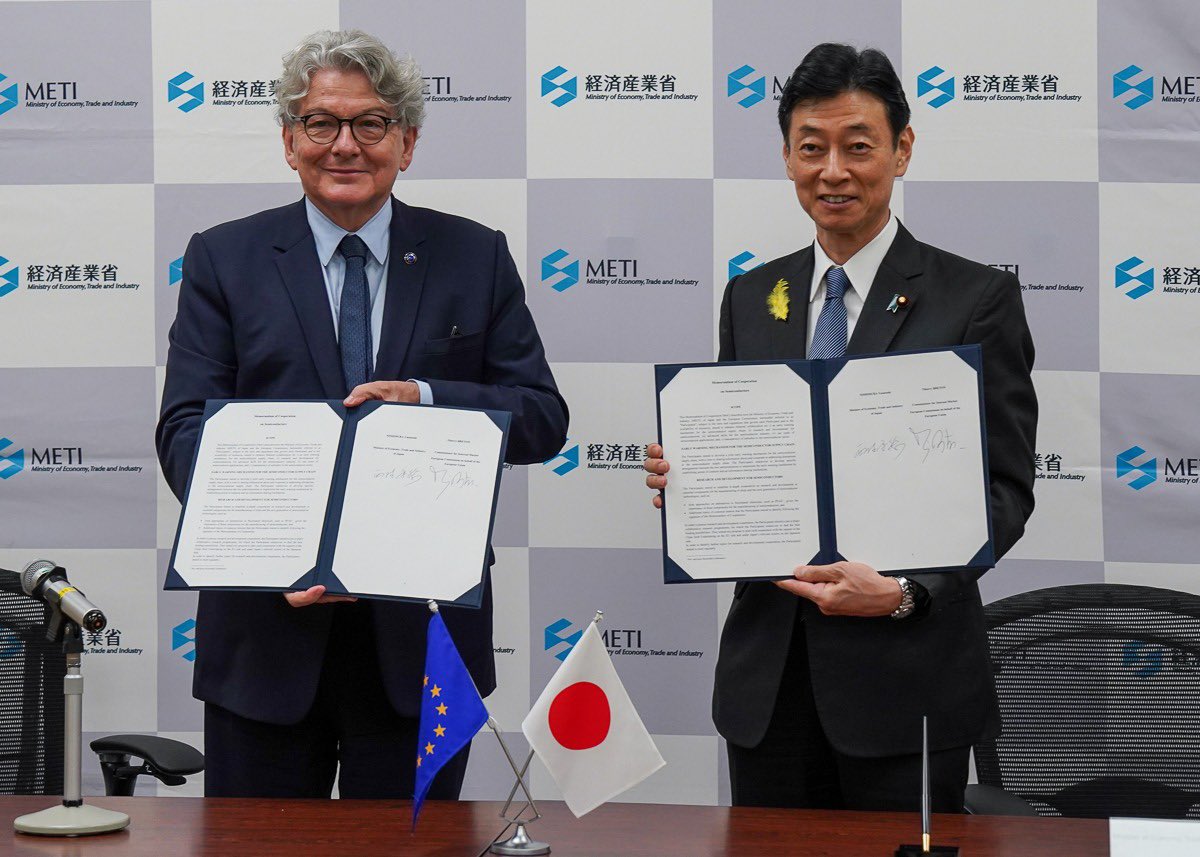European Commissioner for Internal Market Thierry Breton and Japanese Minister of Economy, Trade and Industry Yasutoshi Nishimura signed today (July 4) a Memorandum of Understanding (MOU) on semiconductors.
Japan’s National Security Strategy, released in December 2022, defines economic security as the policy area that seeks “to ensure Japan’s national interests, such as peace, security, and economic prosperity, by carrying out economic measures”.
As Institut Montaigne outlined in its latest report, Economic Security: the Missing Link in EU-Japan Cooperation, Japan is moving fast to revive its declining semiconductor sector. The Japanese government has successfully attracted TSMC to invest in building in Kumamoto a fab that will produce optical integrated circuits for Sony’s sensors. The Japanese government is covering up to 40% of the estimated $8.6 billion cost of the foundry.
Commissioner Breton is visiting Japan this week to encourage digital partnerships, engage in AI and semiconductors and meet CEOs from strategic industries.
The European Union Delegation to Japan, the Research Institute for Economics, Trade and Industry and the EU-Japan Center for Industrial Cooperation co-hosted today a seminar on supply chain resilience.
Current geopolitical tensions call for closer collaboration between like-minded partners. Companies, which have relied on open global trade, need to rethink their strategies for offshoring or relocating certain activities in order to reduce and mitigate the risks of disruption.
In a keynote, Breton explained the EU’s approach and the measures taken to strengthen the resilience of semiconductor supply chains, and relations with Japan, while Japanese government agencies and global companies shared their views on how to overcome supply chain challenges.
“Chips are vital for our economic security,” Breton tweeted just after the MOU was signed. EU and Japan aim to boost the resilience of the chip supply chain, including an early warning mechanism to prevent any disruptions — notably in critical raw materials components.
EU Japan MOU Semiconductors
Commissioner Breton signed with Yasutoshi Nishimura, Minister of Economy, Trade and Industry, a MOU on semiconductors (Image: Thierry Breton)
The Japanese government has facilitated the formation of Rapidus, a company created in 2022 to set up a prototype production line for cutting-edge 2-nm semiconductors by the first half of 2025. Rapidus will acquire the gate-all-around (GAA) technology for a 2-nm chip process node.
Today, Breton met with Tetsuro Higashi, chairman of the board of directors, and Atsuyoshi Koike, president and CEO of Rapidus, to discuss the EU Chips Act. He said, “Like Europe, Japan has great ambitions in producing next-generation semiconductors. Chips below 2 nm will be strategic for AI, low-energy consumption technology and industry of the future.”
As every continent is expanding manufacturing capacities in semiconductors, skills have become a global challenge. In a keynote speech at the ‘Chips and Skills’ event organized yesterday (July 3) by the Office for Economic Policy and Regional Development, Breton said, “Cooperation is key — through research and student programs.”
As part of his visit, Breton went to Fujitsu’s headquarters in Tokyo and met with CEO Takahito Tokita. He tweeted, “Generative AI — integrating large language models into search engines — requires a massive amount of computing power. Both high performance computing and chips are essential — and the EU is the ideal place to invest in.”
